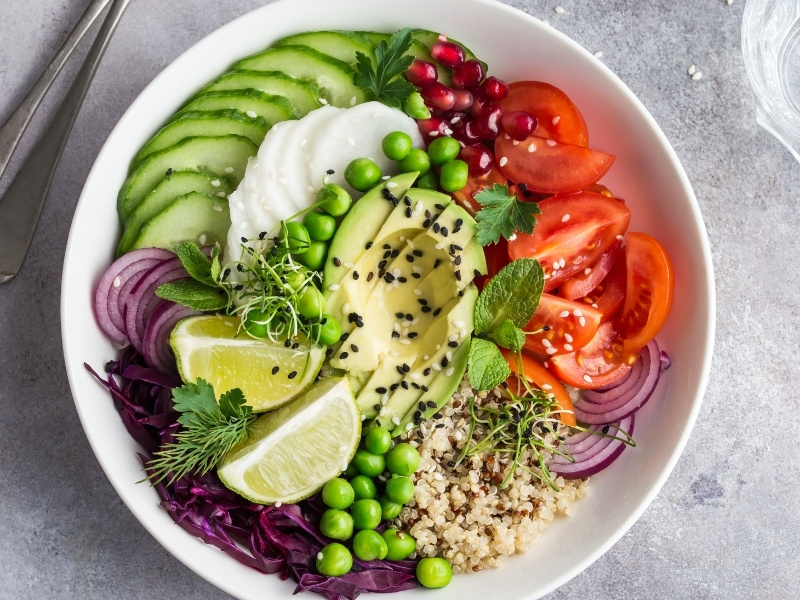Healthy Eating Steps
Discover simple, sustainable habits designed to support your well-being and help manage IBD symptoms.

Sustainable Healthy Eating Steps 1-8
Improving your diet doesn’t have to be overwhelming. The following 5 principles are supported by IOBD, AGA, ECCO guidelines for nutrition in IBD.
By adopting these sustainable dietary habits at your own pace, you can boost your overall health and manage symptoms more effectively.
1. Eat More Whole Foods:
Focus on foods in their natural state, such as whole grains, lean proteins, fresh fruits and vegetables and healthy fat.
2. Limit Added Sugar:
Cutting back on sugary drinks and snacks can support digestive health and overall well-being. For some, setting a goal, such as staying under 25 grams (6 teaspoons) per day, makes it easier to stick with it.
3. Eat More Fruits and Vegetables:
Choose a colorful variety for a broad range of nutrients and fiber. If there is active IBD or strictures present, focus on soft, smooth foods.
Tips for adding more fruit, fiber and vegetables into your diet
Adding more fruits, vegetables, and fiber to your daily routine can be simple and enjoyable. Here are practical tips and strategies to help you boost your intake and reap the health benefits:
- Start with Breakfast
Add fresh or dried fruit (like bananas, berries, or raisins) to your cereal, oatmeal, or yogurt.
Mix chopped vegetables such as spinach, tomatoes, or bell peppers into eggs or breakfast wraps.
- Make Fruits and Vegetables Easy to Grab
Keep washed, ready-to-eat fruits in a visible bowl or store chopped veggies in the fridge for quick snack.
Prepare snack bags with raw veggies (carrots, peppers, celery) or dried fruits and nuts for on-the-go options.
- Upgrade Your Meals
Bulk up sandwiches, wraps, and salads with extra veggies like lettuce, cucumber, tomatoes, or avocado.
Add beans or lentils to soups, stews, and salads for a fiber boost.
Use pre-bagged or frozen vegetables in stir-fries, casseroles, or as side dishes for convenience.
- Snack Smart
Choose fruit or veggie-based snacks, such as apple slices, grapes, or veggie sticks with hummus.
Enjoy a small bowl of mixed salad or a handful of dried fruit as a satisfying snack.
- Eat the Rainbow
Aim for a variety of colors and types of produce each day—different colors provide different nutrients and beneficial plant compounds.
Try to include at least one serving from categories like dark leafy greens, orange/yellow produce, red fruits/veggies, legumes, and citrus.
- Choose Whole Over Processed
Eat whole fruits instead of juice—juices lack fiber and can be high in sugar.
Whenever possible, eat fruits and vegetables with their skins for extra fiber.
- Incorporate Fiber-Rich Foods
Add beans, lentils, and whole grains (like oats, brown rice, or whole-wheat pasta) to meals for additional fiber.
Mix chopped dried fruit into baked goods or sprinkle on salads and cereal.
- Make It a Habit
Aim for at least five servings of fruits and vegetables per day, but more is even better.
Gradually increase fiber to avoid digestive discomfort, and drink plenty of water to help fiber do its job.

4: Limit red and processed meats
This may reduce the risk of colorectal cancer and flares in UC.
5. Limit Food Additives and Processed Foods
Choose fresh, minimally processed foods to decrease exposure to additives that might trigger symptoms. Additives, including artificial colorings and sweeteners, can disrupt gut bacteria balance and raise inflammation, so check labels and minimize their use when possible.
Here are some tips:
- Focus on the Nutrition Facts: Check serving sizes, calories, and nutrients.
- Read the Ingredient List: Look for simple, recognizable ingredients.
- Know the Names of Hidden Sugars: Manufacturers use different names to avoid alarming consumers about the amount of sugar in their products.
- Be Skeptical of Front-of-Package Claims: “Natural” or “Healthy” doesn’t always mean nutritious.
Read the full article on "Decoding the Mystery: Making Sense of Food Labels"

References
- Svolos V, Gordon H, Lomer MCE et al. ECCO Consensus on Dietary Management of Inflammatory Bowel Disease, Journal of Crohn's and Colitis, 2025;, jjaf122, https://doi.org/10.1093/ecco-jcc/jjaf122
- Hashash JG, Elkins J, Lewis JD, et al. (2024). AGA Clinical Practice Update on Diet and Nutritional Therapies in Patients With Inflammatory Bowel Disease: Expert Review. Gastroenterology. 2024; 166(3):521-532. doi: 10.1053/j.gastro.2023.11.303.
- Levine A, Rhodes JM, Lindsay JO, et al. Dietary Guidance From the International Organization for the Study of Inflammatory Bowel Diseases. Clinical Gastroenterology and Hepatology. 2020;18(6):1381-1392. doi:10.1016/j.cgh.2020.01.046
- Nazarenkov N, Seeger K, Beeken L, et al. Implementing Dietary Modifications and Assessing Nutritional Adequacy of Diets for Inflammatory Bowel Disease. Gastroenterol Hepatol (N Y). 2019;15(3):133-144. https://pubmed.ncbi.nlm.nih.gov/31061655/
- Sasson AN, Ananthakrishnan AN, Raman M. Diet in Treatment of Inflammatory Bowel Diseases. Clinical Gastroenterology and Hepatology. 2021;19(3):425-435.e3. doi:10.1016/j.cgh.2019.11.054
- Laudisi, Stolfi, Monteleone. Impact of Food Additives on Gut Homeostasis. Nutrients. 2019;11(10):2334. doi:10.3390/nu11102334
- Marion-Letellier R, Amamou A, Savoye G, Ghosh S. Inflammatory Bowel Diseases and Food Additives: To Add Fuel on the Flames! Nutrients. 2019;11(5):1111. doi:10.3390/nu11051111
- Chassaing B, Van de Wiele T, De Bodt J, Marzorati M, Gewirtz AT. Dietary emulsifiers directly alter human microbiota composition and gene expression ex vivo potentiating intestinal inflammation. Gut. 2017;66(8):1414-1427. doi:10.1136/gutjnl-2016-313099
Additional Essential Steps for Supporting Your Health and Well-Being
Improving your overall health involves more than just what you eat. By paying attention to hydration, nutrition deficiencies, mindful eating habits, and stress management, you can make meaningful strides toward feeling your best. These foundational steps benefit everyone seeking better well-being, but are especially important for individuals managing chronic conditions like IBD.
The following practices can help you build a strong foundation for health:
1. Set a Daily Hydration goal
People with IBD have a higher risk of dehydration and often don’t drink enough water. Setting a specific goal, like 8 glasses of water per day, will help to increase daily fluid intake.

2. Check for and Correct Micronutrient Deficiencies
Micronutrient deficiencies are highly prevalent among people with IBD, yet they often go unnoticed because regular testing and monitoring are not always performed. Deficiencies in nutrients such as iron, vitamin B12, vitamin D, folic acid, zinc, selenium, and others can contribute to complications like anemia, fatigue, and impaired immune function. To protect your health, ask your healthcare provider to routinely check your blood levels for key vitamins and minerals, even if you feel well, since deficiencies can occur without obvious symptoms.
Learn more about Malnutrition and IBD
3. Focus on Eating Behavior
Many people eat too quickly and need reminders to slow down. How food is eaten matters as much as what’s eaten. Chewing well and eating slowly can ease symptoms and lower the risk of bowel obstruction.
Learn more tips in our Mindful Eating article.
4. Incorporate a Daily Mind-Body Practice
Stress is a known IBD trigger. Even 10 minutes of yoga, meditation, or breathing exercises can make a real difference.


Need Personalized Support?
A registered dietitian can help personalize these steps to fit your unique needs. For more information, reach out to your healthcare team.
If you don’t have access to a gastroenterologist or registered dietitian with expertise in nutrition and IBD, we provide a list of IBD experts who may be able to assist you.




Support our Mission
Your donation will help us to enhance the well-being and health outcomes of patients with IBD.
Donate Donate
Donate